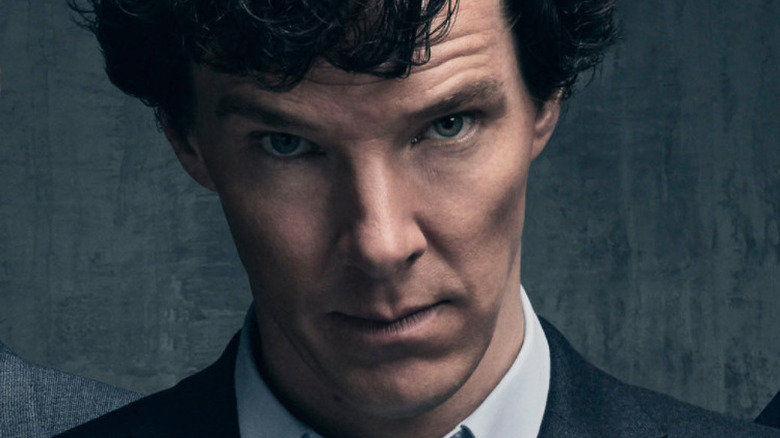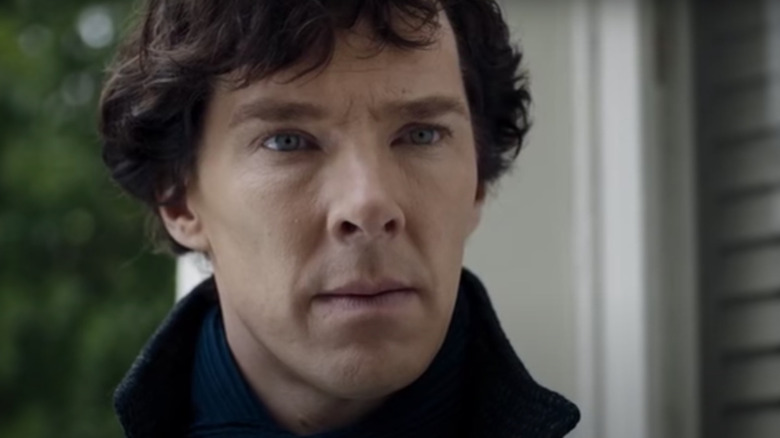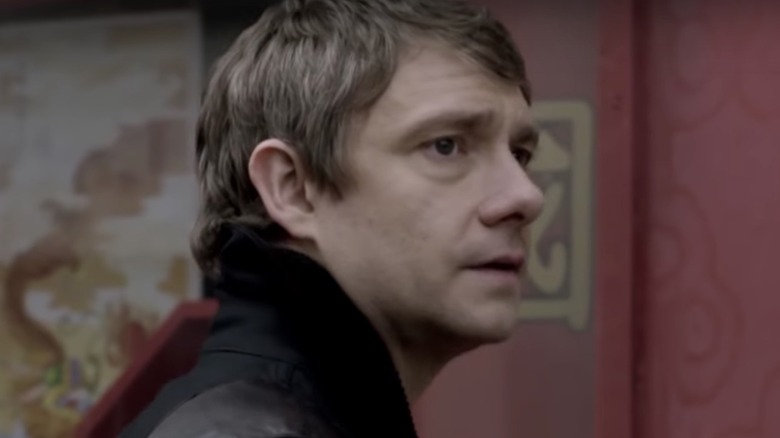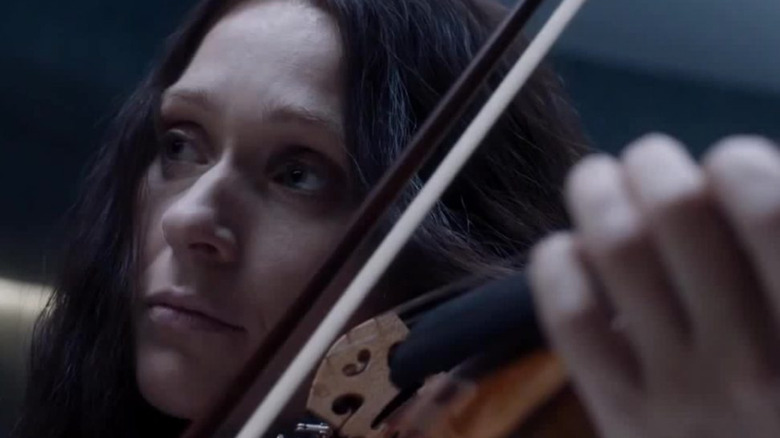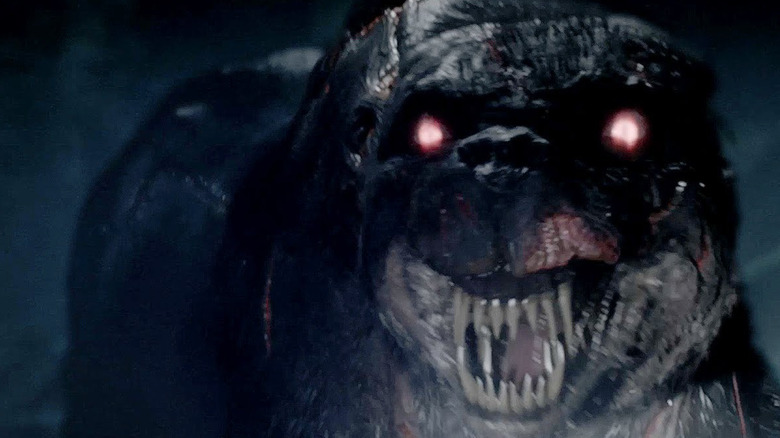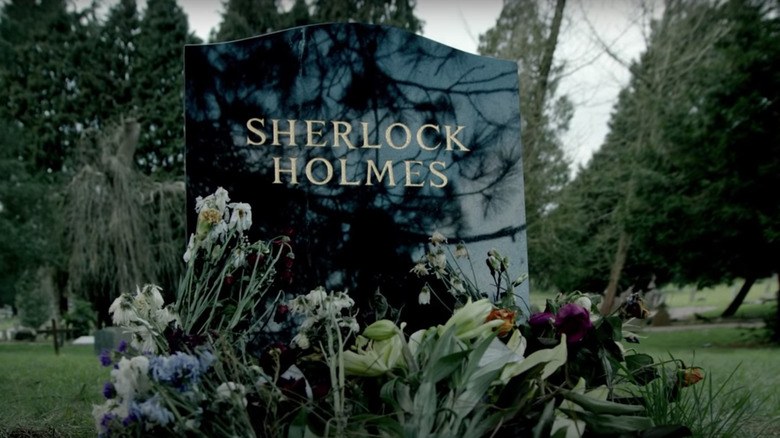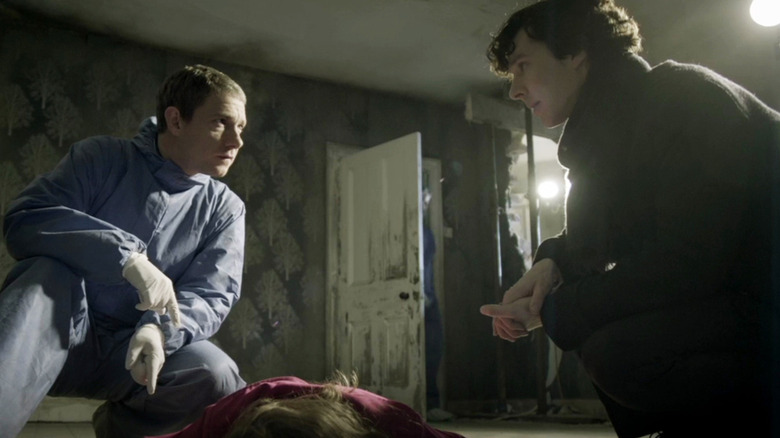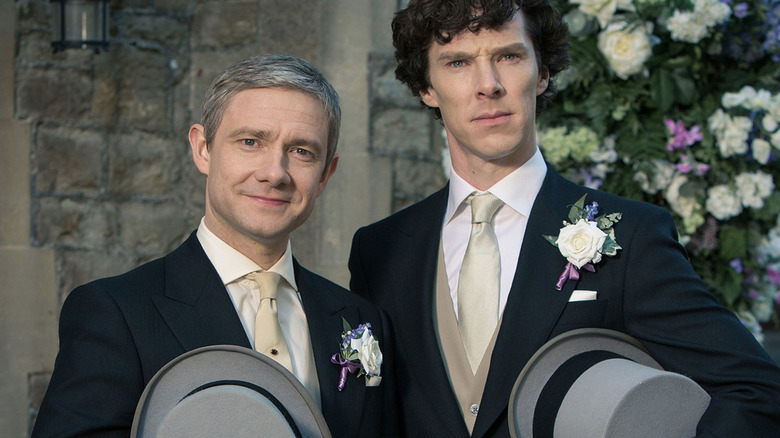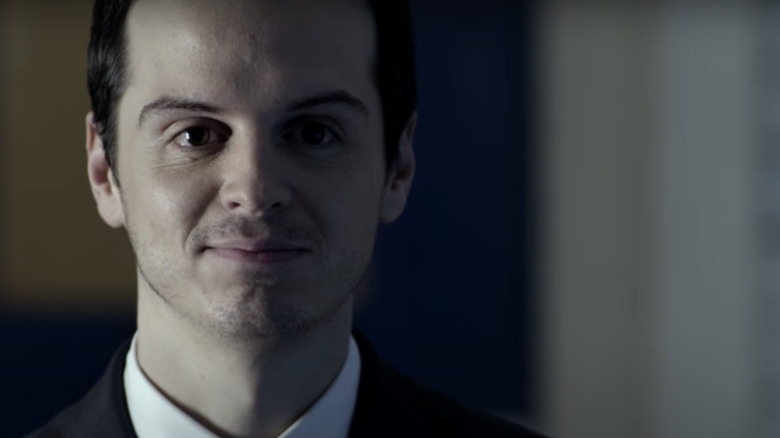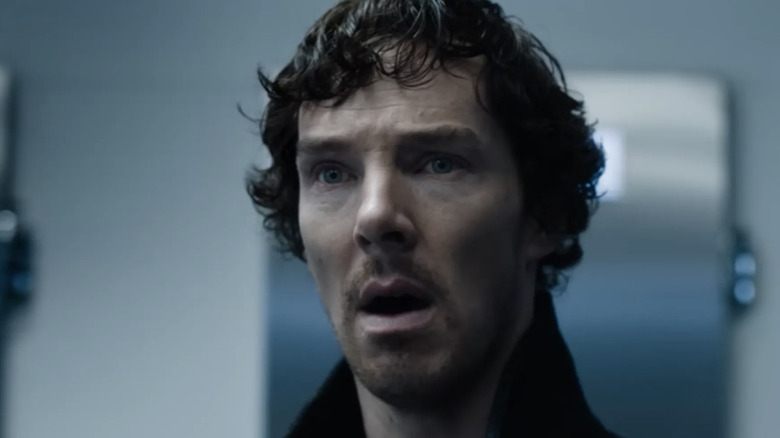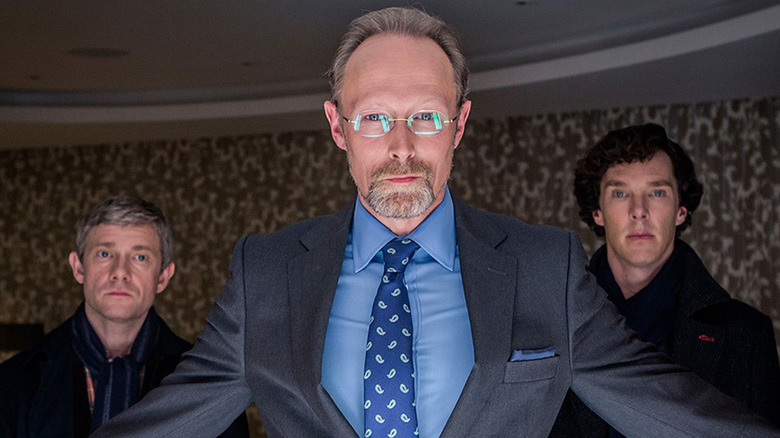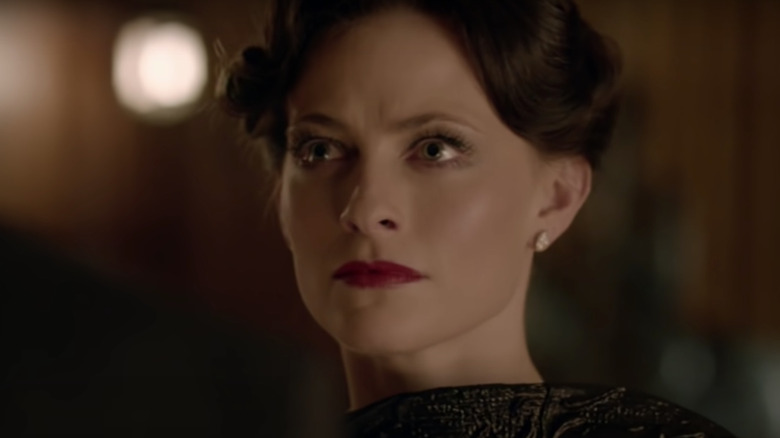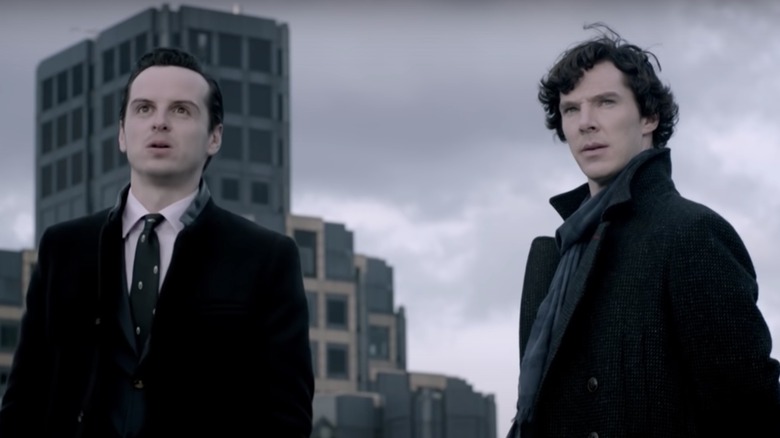Every Episode Of Sherlock Ranked, According To IMDb
The spirit of Sherlock Holmes has been shining bright for over a century, spawning countless adaptations of Sir Arthur Conan Doyle's celebrated stories. Sherlock's powers of deduction are legendary, and few people can hear his name without picturing dorky headpieces and old-fashioned pipes. Holmes has been a source of inspiration for so many characters and stories, in fact, that identifying the exact amount of Sherlock adaptations out there is anything but elementary. For many modern fans, however, BBC's "Sherlock" is at the top of their list of favorites.
Benedict Cumberbatch was already a veteran of British television and film by the time "Sherlock" debuted in 2010, but the series catapulted his career into the stratosphere. Alongside his loyal companion, John Watson (Martin Freeman), the legendary detective's powers of deduction have never been more entertaining than they are as portrayed by Cumberbatch. Fans have been blessed with four seasons of 90-minute adventures — each episode feels less like a show and more like its own distinct movie. But with multiple directors, long hiatuses, and the success of the show's stars getting in the way, "Sherlock" is a bit of a roller coaster in terms of consistency.
Which "Sherlock" episodes soar, and which sink like a stone? The people have spoken, via IMDb, and what they have to say might surprise you. This is every thrilling episode of "Sherlock," ranked from worst to best.
12. The Six Thatchers
Sherlock is left in a difficult position at the end of Season 3 after defeating Charles Magnussen (Lars Mikkelsen). The detective is essentially yanked out of the fire, hit with a frying pan, then tossed into a bigger fire. After fans witnessed the double-edged sword of victory slice across the story, they then had to wait three years for resolution. This undoubtedly factors into the public's low opinion of "The Six Thatchers" — that, and the fact that it's a jumbled, convoluted mess.
Sherlock and Watson are still fun to watch, but the story they navigate in "The Six Thatchers" is more complex than it needs to be. The conflict's resolution is relatively simple, which makes the entire hour-and-a-half ordeal feel unnecessary. Mary Watson dominates much of the episode as well, and the story involves a large amount of information from past seasons. This is a serious annoyance when you've waited three years for more "Sherlock."
Still, the episode's decent-enough rating is nothing to scoff at — even the worst "Sherlock" episode is entertaining. "The Six Thatchers" reveals a changed Sherlock Holmes, and effectively sets the stage for the rest of the season. Sure, you have to trudge through a web of mid-tier awesome to get to Season 4's good stuff, but most fans are happy to make the journey.
11. The Blind Banker
The pilot episode of "Sherlock" is enough to hook most fans, who frantically free up their schedule to consume as much of the show as possible. The second episode, "The Blind Banker," seems to hit the ground running in the first 30 minutes, with loads of quick, witty dialogue. Yet the episode feels pretty forgettable by the end. There is no primary antagonist to fight against, and many of the supporting characters we love are absent. Like any other "Sherlock" episode, the story's mystery is intriguing enough to keep retinas glued to the screen, but any exhilaration evoked is muted.
"Sherlock" producers made a solid move by bringing in "Doctor Who" veteran Euros Lyn to direct this episode. However, though you'd expect time management to be this director's forte, "The Blind Banker" runs out of steam about halfway through — which is coincidentally around the time an episode of "Doctor Who" would come to a close. At this point, Watson has not been fully integrated as Holmes' right-hand man, so much of the episode is about him finding a job and going on a date while Holmes tries to decipher symbols elsewhere. This is entertaining enough, and we get the first whiff of an elusive villain who, at this point, goes by "M." But the flair we love and expect from "Sherlock" doesn't shine through as brightly as it should.
10. The Final Problem
Whimsy is not what one usually expects from a Sherlock Holmes adventure. Much of the appeal of "Sherlock," in fact, lies in how grounded it feels. The story is rooted in a reality that the audience finds plausible — or at least plausible enough. Gradually, however, Season 4 of "Sherlock" veers into superhuman territory, where a super-secret maximum security prison can be compromised by the manipulative powers of a single evil genius.
In "The Final Problem," Season 4's final episode, the Holmes' family's skeletons finally spill from their closet. Sherlock's brother Mycroft (Mark Gatiss) reveals that their sister Eurus (Sian Brooke) has been locked up in prison per his own orders. Up until this moment, everyone, including Sherlock, believed her to be dead. Eurus' incarceration may seem like overkill, but she did murder Sherlock's childhood friend and then burned their family's house down. Mycroft, it turns out, used the arson to fake her death and lock her up.
It's all a wild trip down memory lane for the whole Holmes family, but for audiences, it's a total departure from grounded reality. As a stand-alone piece, "The Final Problem" is a fantastic work of Holmes lore that any fan of good TV can enjoy. But in the context of the show, it's a departure from the essence of "Sherlock" fans fell in love with.
9. The Hounds of Baskerville
One of the most popular Sherlock Holmes stories is "The Hound of the Baskervilles." It's such a beloved tale, in fact, that Mark Gatiss felt a personal responsibility to pen the episode based off it himself. "The reputation of the story was obviously a challenge," Gatiss stated in a BBC interview, "It's the most famous and best-loved of them all. No pressure!" He went on to explain that maintaining the horror element of the tale was of utmost importance. We'd say the man succeeded: "The Hounds of Baskerville" feels more like a thriller than a mystery.
Doyle penned "The Hound of the Baskervilles" after killing off Sherlock Holmes in 1893's "The Final Problem." Just as it must have felt a bit strange for readers of that era to enjoy a new Sherlock Holmes story after enduring the character's death, this episode of "Sherlock" feels like it plops our detective duo in the middle of a random "X-Files" episode, complete with myth, legend, and government conspiracy. Sherlock is intrigued by a tale of a monstrous hound near a government facility in Dartmoor, and sets off to unravel the truth behind the old ghost story. This sounds a tad outside the box for the logical Sherlock we know, but it all comes together in the end. Season 2 of "Sherlock" proved to be one of the best, and this fun addition is a good example of why.
8. The Empty Hearse
Season 3 opens up with "The Empty Hearse," which takes place two years after Sherlock's showdown with Jim Moriarty (Andrew Scott). Last we saw, Holmes had leapt to his death in order to ensure Moriarty's plan didn't come to fruition. For most of this episode, we follow a morose Watson, who continues to mourn the loss of his best friend.
When he learns Sherlock is alive, Watson is full of bitterness. Initially, one might want Watson to get over it, so the Sherlock-and-Watson adventures can resume. But honestly, it's hard not to end up being angry right along with Watson. How dare Sherlock put his pal through such suffering?! This resentment and turmoil ends up strengthening the pair's relationship. Good thing, too, otherwise there wouldn't be anyone to stop an entire train car filled with explosives from detonating under Parliament on Guy Fawkes Night.
"The Empty Hearse" also offers answers to the many questions regarding Sherlock's supposed death. The end of Season 2 tends to worry first-time watchers, who might assume the creators have written themselves into a corner. But this entertaining season opener allays those fears. This episode also contains one of Martin Freeman's best performances: Watson is deeply hurt by Sherlock's actions, and it shows. But still, their interactions are as hilarious and cutting as ever. It's a difficult balance to strike, but Freeman does it with finesse.
7. A Study in Pink
It's no small thing for a series' first episode to receive such a high rating, yet still come in seventh place overall. "Sherlock" kicks off innocently enough, with John Watson searching for a place to live when he meets Sherlock Holmes. Why would a man partner up with someone as neurotic and difficult as Sherlock Holmes? The answer is revealed when a man abducts Watson and offers to pay him money to spy on Sherlock. This man apparently has access to vast amounts of information, because he brings up a conversation Watson had with his therapist regarding post-traumatic stress from his time in Afghanistan. The man claims that Watson actually misses the battlefield, and that civilian life is too dull and boring for him.
What a lovely surprise for the thrill-seeking doctor, that he should bunk up with someone who constantly runs into burning buildings. It may look like Watson is yanked into Holmes' world involuntarily, but in fact, Watson craves adventure. Thus, he continues down the path of life with Sherlock. On top of this efficient character development, the series shows off all its tools in portraying how Sherlock's brilliant mind works as he unravels a mystery involving a serial killer who convinces his victims to kill themselves. Pilot episodes can sometimes feel like a crawl, as a show works overtime to find its identity. But "Sherlock" arrives with a fully-formed foundation.
6. The Sign of Three
The greatest strength of "The Sign of Three" is its portrayal of Sherlock's humanity. Watson is getting married and Sherlock is his best man, of course. Thrusting Sherlock into the spotlight and forcing him to publicly express his feelings reminds us just how socially awkward our favorite high-functioning sociopath is. Delightfully, the show's creators use Sherlock's best man speech as a moment to humorously present past cases that happened off-camera, disguised as Sherlock's nervous reaction to public speaking. A wedding is hardly the place to describe crime scenes in gruesome detail, but Sherlock barrels ahead, ruining everyone's appetites in unforgettable fashion.
In attendance at the Watson wedding is John's former army commander, James Sholto (Alistair Petrie), who now lives in seclusion because of a highly publicized loss in Afghanistan. It is impossible for Watson to have a moment of calm in his life, so naturally, Sholto is targeted at the wedding. The cases Sherlock references in his best man speech end up playing a crucial part in putting all the puzzle pieces into place. The mystery-solving in "The Sign of Three" is as entertaining as always, but the episode's connection to the characters is its true achievement. It's hilarious. It's heart-wrenching. It's brilliant.
5. The Great Game
Throughout Season 1, Sherlock Holmes is an unstoppable force of logic. The man's mental acuity is unrivaled — until the introduction of his arch-nemesis at the end of "The Great Game". The end of the previous episode shows Mycroft Holmes releasing Jim Moriarty from his prison. The reasoning behind that decision is a whole different affair, but what matters is that it brings one of the most memorable villains in literary history into the show.
"The Great Game" sees Sherlock and Watson conquer a series of rapid-fire mysteries, all of which stem from obscure clues sent to Sherlock via text. The trail leads to a final confrontation with Moriarty, who holds Watson hostage by forcing him into a vest covered in explosives. In previous representations of Moriarty, he's a posh socialite with a large ego. In "Sherlock," however, we are presented with a mad genius who has spun a complex web behind the scenes for years. Even more alarming, the man is obsessed with facing off against Sherlock in lethal mental combat. We don't mean to gloss over all the mystery solving that takes place throughout this episode — it truly is miraculous how quickly Sherlock is able to solve cases using his powers of deduction. But the cliffhanger we are left with at the end of "The Great Game" is the entire season's apex. This episode solidified many fans' love of the show, and had them saying, "Robert Downey Who?"
4. The Lying Detective
The most captivating moments in "Sherlock" occur when we are reminded that Sherlock Holmes is flawed. It is dazzling to watch him navigate mysteries and puzzles with ease, but when he isn't feeding his mind properly, his addiction takes over. When Sherlock is presented with a case to solve in "The Lying Detective," it arrives in the midst of his renewed drug usage. It's a juicy one, too: A woman named Faith shows up with a wild story regarding a rich socialite revealing himself as a serial killer. Before he made his confession, however, he injected those assembled with a mind-altering serum that makes remembering what he said enormously hard to do.
Difficulty arises when Sherlock isn't able to properly express his thought processes due to his drug use. This all occurs while Watson is grieving the loss of his wife, whose death he blames on Sherlock. The show's creators display their ability to continue to surprise fans in "The Lying Detective:" The twists that occur at this episode's climax leave viewers boggling as to how Holmes snuck his plan through the story's events. "The Lying Detective" is followed by Season 4's finale episode, which some fans find disappointing. But no one should write off the entire season as a loss — "The Lying Detective" is proof that the game is still afoot.
3. His Last Vow
One could argue that "His Last Vow" shows Sherlock Holmes losing a battle of wits. He squares up against a formidable foe in the form of Charles Magnussen, a powerful businessman with heavy media influence. Magnussen uses blackmail against his rivals and prominent government officials in order to achieve his sinister goals. Sherlock is barely able to follow his trail, and, even then, most of his progress is made by just trusting his gut. In the end, it's difficult to decide who really wins.
Piled on top of the episode's mental combat, there is also Watson's discovery of Mary's past, which is a whole separate subplot ripe for devouring. The relationship woes that follow are among the most emotional of the entire series. Moreover, "His Last Vow" offers a much more in-depth look at Sherlock's fabled "mind palace," and the discovery that he is not the only one capable of such memory-based methods. The cherry on top of the episode is its teaser ending, which reveals a fallen enemy's resurrection. It's undeniable at this point in the series that the "Sherlock" creators know how to close out a season with panache: "His Last Vow" is explosive, emotional, and exhilarating.
2. A Scandal in Belgravia
"Shelock" Season 1 ends with the mother of all cliffhangers. The first episode in Season 2, "A Scandal in Belgravia," picks up at the exact moment the show leaves off, with Sherlock facing Moriarty while holding a gun to a vest covered in explosives ... oh, and there are a bunch of snipers taking aim at him. Once he wiggles out of danger, Sherlock enjoys little respite: He immediately has to go up against a femme fatale named Irene Adler (Lara Pulver). She has the ability to disable Sherlock's mental superpowers, and proves to be a double agent playing a part in a grand over-arching scheme.
"A Scandal in Belgravia" steps in at a very crucial moment in the show, and boy, does it deliver the goods. This is top-tier "Sherlock." As with any Sherlock Holmes adventure, fans need to pay close attention if they want to keep up with the mental juggernauts dueling on screen. Yet this episode manages to disarm the viewer, and even makes them forget that there's a bigger game being played. When the twists are revealed, it leaves said viewer just as flabbergasted as the characters. "A Scandal in Belgravia" is just shy of the best-rated "Sherlock" episode of all time. But we'd say that, given how much was riding on opening up Season 2 with a win, it's number one in terms of clutch.
1. The Reichenbach Fall
One of the more brilliant moves "Sherlock" pulls off is making Holmes' notoriety feel plausible in current times: John Watson begins a blog about their cases together, and they become wildly popular. This fame is what sends Sherlock on his first case with the royal family in "A Scandal in Belgravia" and it is what causes Sherlock's clash with Moriarty to be a public affair. The criminal mastermind breaks into a case containing the crown jewels and then threatens the jury into acquitting him of his crimes. It's all a publicity stunt to show off to potential powerful clients and to begin dismantling Sherlock's credibility.
The episode's cold open hints at Sherlock's death, which leaves viewers feeling on edge the entire episode. Then, Moriarty's opaque scheming makes it all feel real. As much as we adore every episode of "Sherlock," it's hard to deny that the conclusion of "The Reichenbach Fall” feels like the entire series' apex. Watching Moriarty use subtle maneuvers to manipulate those close to Sherlock and eventually turn the entire city against him is a masterstroke of entertainment, and an evil endeavor only one of the greatest villains of all time could manifest. When it comes to all-time hero-versus arch-nemesis battles, Jim Moriarty versus Sherlock Holmes still takes the cake, and this is one of the greatest versions of their showdown ever created.
